Question Number 183342 by Shrinava last updated on 25/Dec/22

$$\mathrm{Find}:\:\:\:\:\:\mathrm{3}\:−\:\frac{\mathrm{2}}{\mathrm{3}\:−\:\frac{\mathrm{2}}{\mathrm{3}\:−\:\frac{\mathrm{2}}{…}}}\:=\:? \\ $$
Answered by Red1ight last updated on 25/Dec/22

$$\mathrm{3}−\frac{\mathrm{2}}{{x}}={x} \\ $$$${x}^{\mathrm{2}} −\mathrm{3}{x}+\mathrm{2}=\mathrm{0} \\ $$$${x}=\frac{\mathrm{3}\pm\sqrt{\mathrm{9}−\mathrm{8}}}{\mathrm{2}} \\ $$$${x}=\mathrm{2},{x}=\mathrm{1} \\ $$
Commented by mr W last updated on 25/Dec/22
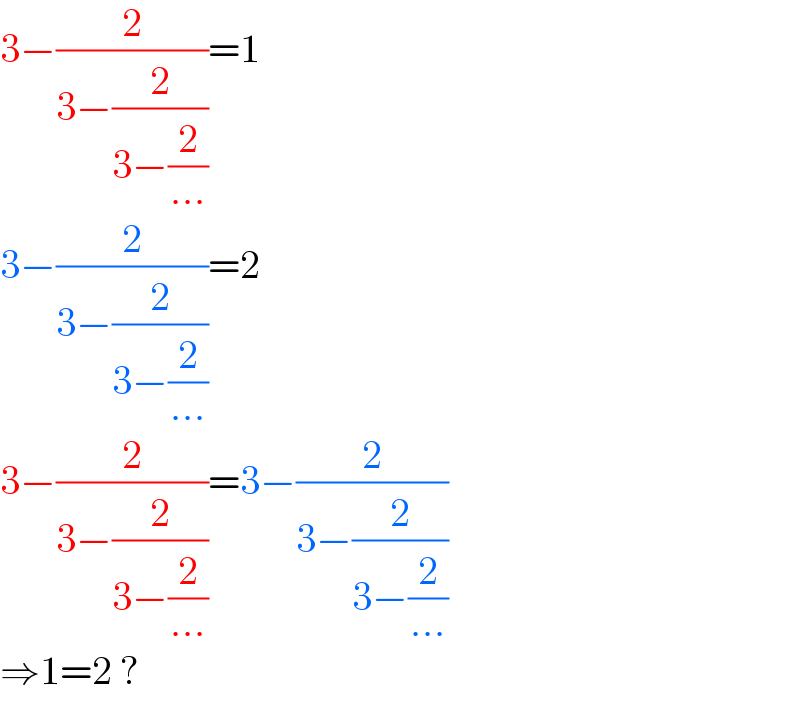
$$\mathrm{3}−\frac{\mathrm{2}}{\mathrm{3}−\frac{\mathrm{2}}{\mathrm{3}−\frac{\mathrm{2}}{…}}}=\mathrm{1} \\ $$$$\mathrm{3}−\frac{\mathrm{2}}{\mathrm{3}−\frac{\mathrm{2}}{\mathrm{3}−\frac{\mathrm{2}}{…}}}=\mathrm{2} \\ $$$$\mathrm{3}−\frac{\mathrm{2}}{\mathrm{3}−\frac{\mathrm{2}}{\mathrm{3}−\frac{\mathrm{2}}{…}}}=\mathrm{3}−\frac{\mathrm{2}}{\mathrm{3}−\frac{\mathrm{2}}{\mathrm{3}−\frac{\mathrm{2}}{…}}} \\ $$$$\Rightarrow\mathrm{1}=\mathrm{2}\:? \\ $$
Answered by Frix last updated on 25/Dec/22
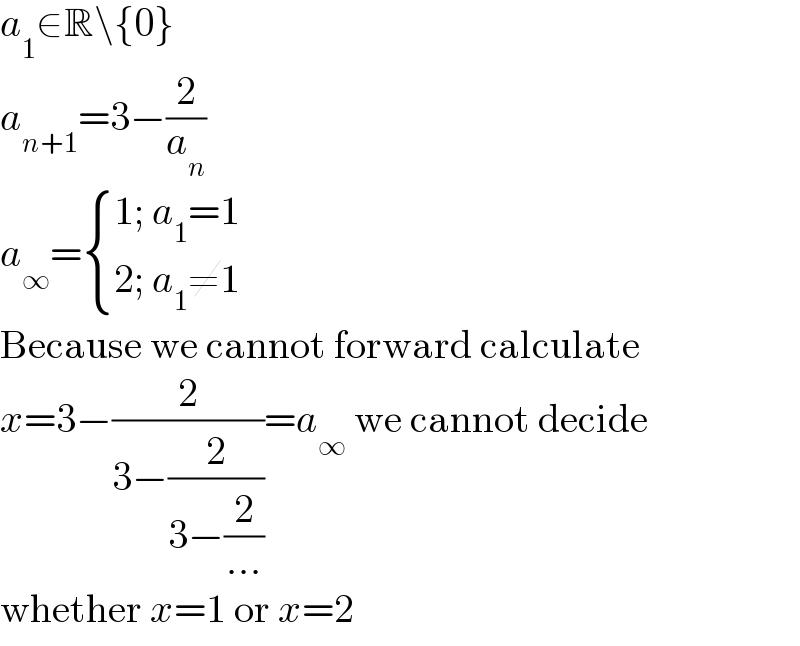
$${a}_{\mathrm{1}} \in\mathbb{R}\backslash\left\{\mathrm{0}\right\} \\ $$$${a}_{{n}+\mathrm{1}} =\mathrm{3}−\frac{\mathrm{2}}{{a}_{{n}} } \\ $$$${a}_{\infty} =\begin{cases}{\mathrm{1};\:{a}_{\mathrm{1}} =\mathrm{1}}\\{\mathrm{2};\:{a}_{\mathrm{1}} \neq\mathrm{1}}\end{cases} \\ $$$$\mathrm{Because}\:\mathrm{we}\:\mathrm{cannot}\:\mathrm{forward}\:\mathrm{calculate} \\ $$$${x}=\mathrm{3}−\frac{\mathrm{2}}{\mathrm{3}−\frac{\mathrm{2}}{\mathrm{3}−\frac{\mathrm{2}}{…}}}={a}_{\infty} \:\mathrm{we}\:\mathrm{cannot}\:\mathrm{decide} \\ $$$$\mathrm{whether}\:{x}=\mathrm{1}\:\mathrm{or}\:{x}=\mathrm{2} \\ $$
Commented by Shrinava last updated on 25/Dec/22

$$\mathrm{Answer}:\:\mathrm{2} \\ $$
Commented by Frix last updated on 25/Dec/22

$$\mathrm{Then}\:\mathrm{try}\:\mathrm{to}\:\mathrm{prove}\:{x}\neq\mathrm{1} \\ $$
Answered by mahdipoor last updated on 25/Dec/22
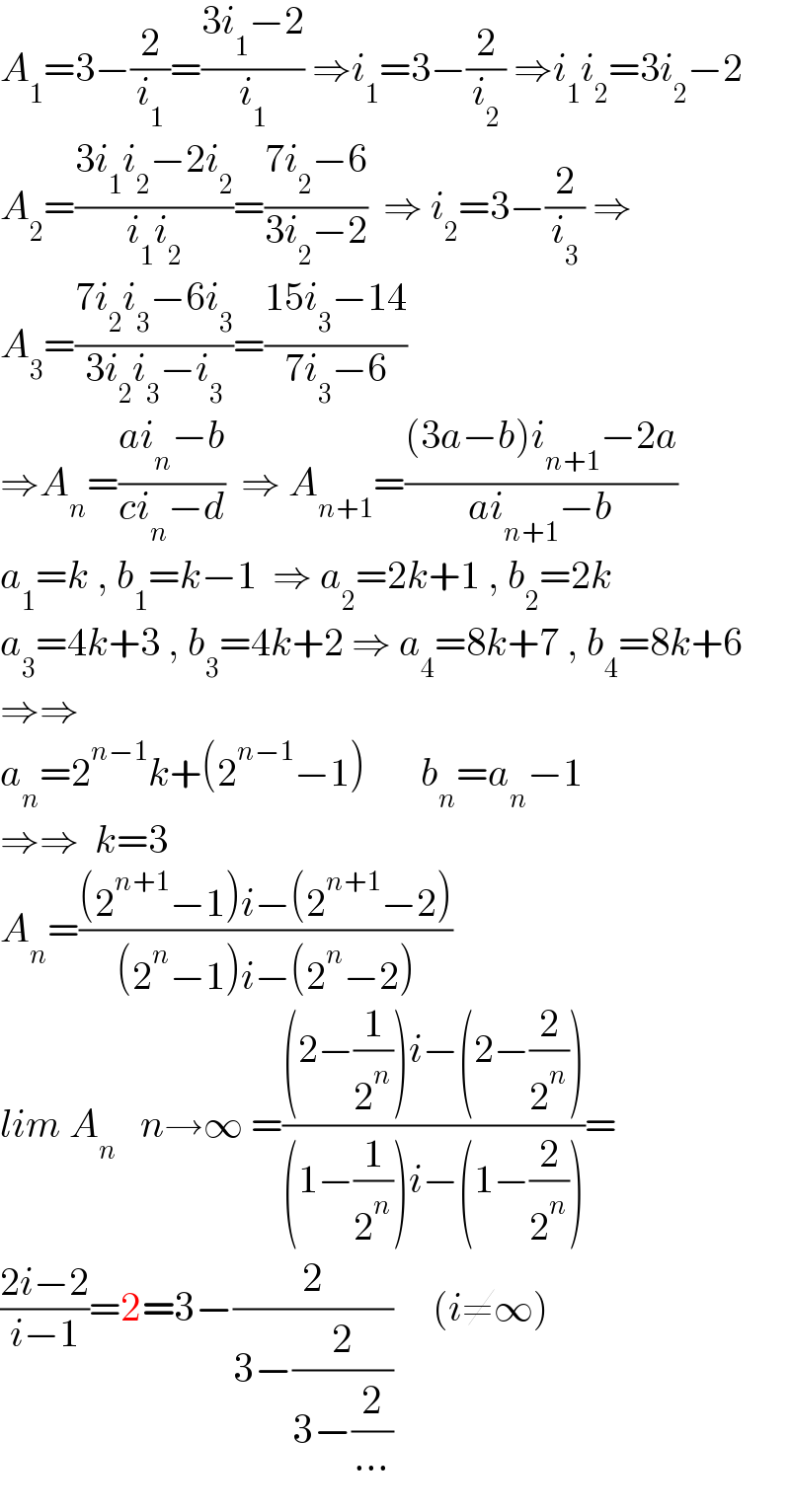
$${A}_{\mathrm{1}} =\mathrm{3}−\frac{\mathrm{2}}{{i}_{\mathrm{1}} }=\frac{\mathrm{3}{i}_{\mathrm{1}} −\mathrm{2}}{{i}_{\mathrm{1}} }\:\Rightarrow{i}_{\mathrm{1}} =\mathrm{3}−\frac{\mathrm{2}}{{i}_{\mathrm{2}} }\:\Rightarrow{i}_{\mathrm{1}} {i}_{\mathrm{2}} =\mathrm{3}{i}_{\mathrm{2}} −\mathrm{2} \\ $$$${A}_{\mathrm{2}} =\frac{\mathrm{3}{i}_{\mathrm{1}} {i}_{\mathrm{2}} −\mathrm{2}{i}_{\mathrm{2}} }{{i}_{\mathrm{1}} {i}_{\mathrm{2}} }=\frac{\mathrm{7}{i}_{\mathrm{2}} −\mathrm{6}}{\mathrm{3}{i}_{\mathrm{2}} −\mathrm{2}}\:\:\Rightarrow\:{i}_{\mathrm{2}} =\mathrm{3}−\frac{\mathrm{2}}{{i}_{\mathrm{3}} }\:\Rightarrow \\ $$$${A}_{\mathrm{3}} =\frac{\mathrm{7}{i}_{\mathrm{2}} {i}_{\mathrm{3}} −\mathrm{6}{i}_{\mathrm{3}} }{\mathrm{3}{i}_{\mathrm{2}} {i}_{\mathrm{3}} −{i}_{\mathrm{3}} }=\frac{\mathrm{15}{i}_{\mathrm{3}} −\mathrm{14}}{\mathrm{7}{i}_{\mathrm{3}} −\mathrm{6}} \\ $$$$\Rightarrow{A}_{{n}} =\frac{{ai}_{{n}} −{b}}{{ci}_{{n}} −{d}}\:\:\Rightarrow\:{A}_{{n}+\mathrm{1}} =\frac{\left(\mathrm{3}{a}−{b}\right){i}_{{n}+\mathrm{1}} −\mathrm{2}{a}}{{ai}_{{n}+\mathrm{1}} −{b}} \\ $$$${a}_{\mathrm{1}} ={k}\:,\:{b}_{\mathrm{1}} ={k}−\mathrm{1}\:\:\Rightarrow\:{a}_{\mathrm{2}} =\mathrm{2}{k}+\mathrm{1}\:,\:{b}_{\mathrm{2}} =\mathrm{2}{k} \\ $$$${a}_{\mathrm{3}} =\mathrm{4}{k}+\mathrm{3}\:,\:{b}_{\mathrm{3}} =\mathrm{4}{k}+\mathrm{2}\:\Rightarrow\:{a}_{\mathrm{4}} =\mathrm{8}{k}+\mathrm{7}\:,\:{b}_{\mathrm{4}} =\mathrm{8}{k}+\mathrm{6}\: \\ $$$$\Rightarrow\Rightarrow \\ $$$${a}_{{n}} =\mathrm{2}^{{n}−\mathrm{1}} {k}+\left(\mathrm{2}^{{n}−\mathrm{1}} −\mathrm{1}\right)\:\:\:\:\:\:\:{b}_{{n}} ={a}_{{n}} −\mathrm{1} \\ $$$$\Rightarrow\Rightarrow\:\:{k}=\mathrm{3} \\ $$$${A}_{{n}} =\frac{\left(\mathrm{2}^{{n}+\mathrm{1}} −\mathrm{1}\right){i}−\left(\mathrm{2}^{{n}+\mathrm{1}} −\mathrm{2}\right)}{\left(\mathrm{2}^{{n}} −\mathrm{1}\right){i}−\left(\mathrm{2}^{{n}} −\mathrm{2}\right)} \\ $$$${lim}\:{A}_{{n}} \:\:\:{n}\rightarrow\infty\:=\frac{\left(\mathrm{2}−\frac{\mathrm{1}}{\mathrm{2}^{{n}} }\right){i}−\left(\mathrm{2}−\frac{\mathrm{2}}{\mathrm{2}^{{n}} }\right)}{\left(\mathrm{1}−\frac{\mathrm{1}}{\mathrm{2}^{{n}} }\right){i}−\left(\mathrm{1}−\frac{\mathrm{2}}{\mathrm{2}^{{n}} }\right)}= \\ $$$$\frac{\mathrm{2}{i}−\mathrm{2}}{{i}−\mathrm{1}}=\mathrm{2}=\mathrm{3}−\frac{\mathrm{2}}{\mathrm{3}−\frac{\mathrm{2}}{\mathrm{3}−\frac{\mathrm{2}}{…}}}\:\:\:\:\:\left({i}\neq\infty\right) \\ $$
Commented by Frix last updated on 25/Dec/22
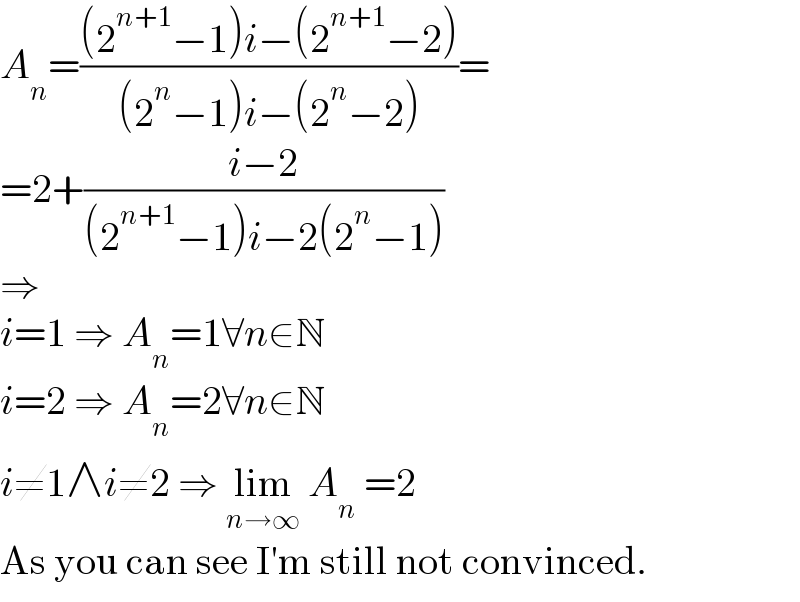
$${A}_{{n}} =\frac{\left(\mathrm{2}^{{n}+\mathrm{1}} −\mathrm{1}\right){i}−\left(\mathrm{2}^{{n}+\mathrm{1}} −\mathrm{2}\right)}{\left(\mathrm{2}^{{n}} −\mathrm{1}\right){i}−\left(\mathrm{2}^{{n}} −\mathrm{2}\right)}= \\ $$$$=\mathrm{2}+\frac{{i}−\mathrm{2}}{\left(\mathrm{2}^{{n}+\mathrm{1}} −\mathrm{1}\right){i}−\mathrm{2}\left(\mathrm{2}^{{n}} −\mathrm{1}\right)} \\ $$$$\Rightarrow \\ $$$${i}=\mathrm{1}\:\Rightarrow\:{A}_{{n}} =\mathrm{1}\forall{n}\in\mathbb{N} \\ $$$${i}=\mathrm{2}\:\Rightarrow\:{A}_{{n}} =\mathrm{2}\forall{n}\in\mathbb{N} \\ $$$${i}\neq\mathrm{1}\wedge{i}\neq\mathrm{2}\:\Rightarrow\:\underset{{n}\rightarrow\infty} {\mathrm{lim}}\:{A}_{{n}} \:=\mathrm{2} \\ $$$$\mathrm{As}\:\mathrm{you}\:\mathrm{can}\:\mathrm{see}\:\mathrm{I}'\mathrm{m}\:\mathrm{still}\:\mathrm{not}\:\mathrm{convinced}. \\ $$
Commented by Frix last updated on 25/Dec/22
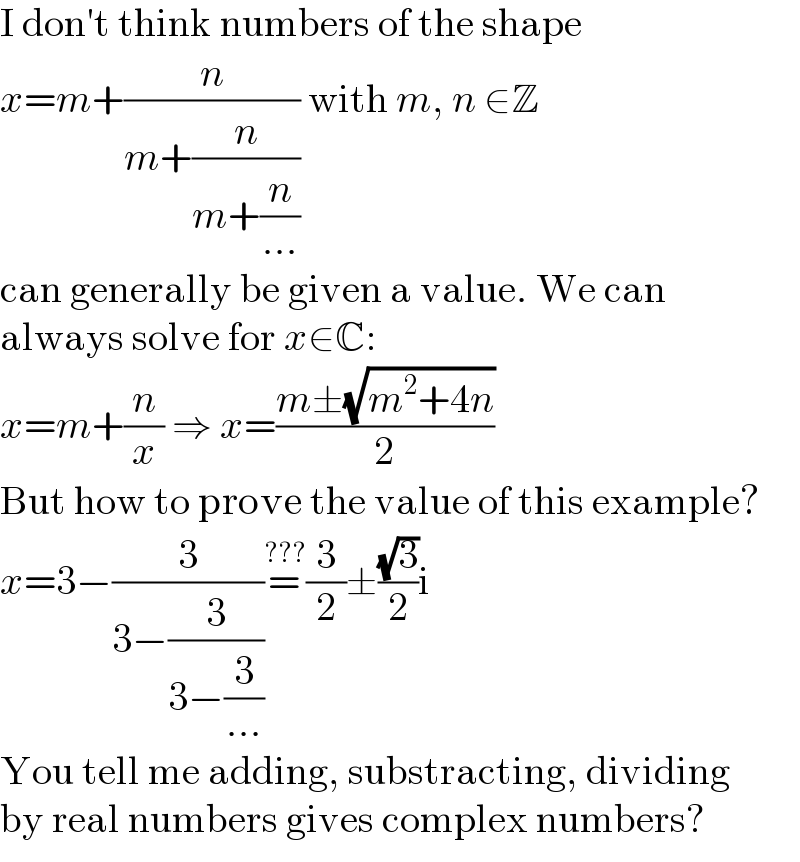
$$\mathrm{I}\:\mathrm{don}'\mathrm{t}\:\mathrm{think}\:\mathrm{numbers}\:\mathrm{of}\:\mathrm{the}\:\mathrm{shape} \\ $$$${x}={m}+\frac{{n}}{{m}+\frac{{n}}{{m}+\frac{{n}}{…}}}\:\mathrm{with}\:{m},\:{n}\:\in\mathbb{Z} \\ $$$$\mathrm{can}\:\mathrm{generally}\:\mathrm{be}\:\mathrm{given}\:\mathrm{a}\:\mathrm{value}.\:\mathrm{We}\:\mathrm{can} \\ $$$$\mathrm{always}\:\mathrm{solve}\:\mathrm{for}\:{x}\in\mathbb{C}: \\ $$$${x}={m}+\frac{{n}}{{x}}\:\Rightarrow\:{x}=\frac{{m}\pm\sqrt{{m}^{\mathrm{2}} +\mathrm{4}{n}}}{\mathrm{2}} \\ $$$$\mathrm{But}\:\mathrm{how}\:\mathrm{to}\:\mathrm{prove}\:\mathrm{the}\:\mathrm{value}\:\mathrm{of}\:\mathrm{this}\:\mathrm{example}? \\ $$$${x}=\mathrm{3}−\frac{\mathrm{3}}{\mathrm{3}−\frac{\mathrm{3}}{\mathrm{3}−\frac{\mathrm{3}}{…}}}\overset{???} {=}\frac{\mathrm{3}}{\mathrm{2}}\pm\frac{\sqrt{\mathrm{3}}}{\mathrm{2}}\mathrm{i} \\ $$$$\mathrm{You}\:\mathrm{tell}\:\mathrm{me}\:\mathrm{adding},\:\mathrm{substracting},\:\mathrm{dividing} \\ $$$$\mathrm{by}\:\mathrm{real}\:\mathrm{numbers}\:\mathrm{gives}\:\mathrm{complex}\:\mathrm{numbers}? \\ $$
Commented by mahdipoor last updated on 26/Dec/22
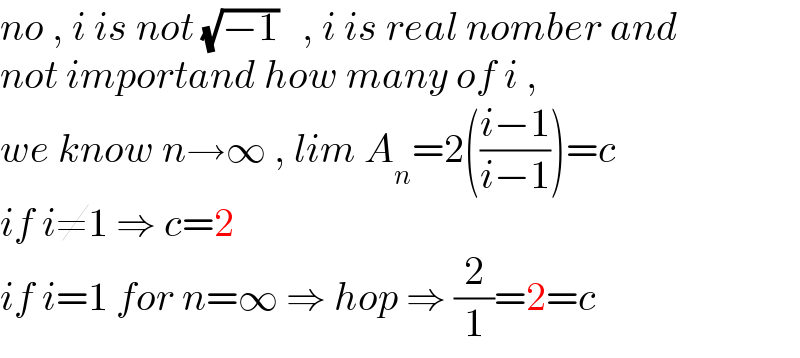
$${no}\:,\:{i}\:{is}\:{not}\:\sqrt{−\mathrm{1}}\:\:\:,\:{i}\:{is}\:{real}\:{nomber}\:{and}\: \\ $$$${not}\:{importand}\:{how}\:{many}\:{of}\:{i}\:, \\ $$$${we}\:{know}\:{n}\rightarrow\infty\:,\:{lim}\:{A}_{{n}} =\mathrm{2}\left(\frac{{i}−\mathrm{1}}{{i}−\mathrm{1}}\right)={c}\: \\ $$$${if}\:{i}\neq\mathrm{1}\:\Rightarrow\:{c}=\mathrm{2} \\ $$$${if}\:{i}=\mathrm{1}\:{for}\:{n}=\infty\:\Rightarrow\:{hop}\:\Rightarrow\:\frac{\mathrm{2}}{\mathrm{1}}=\mathrm{2}={c} \\ $$
